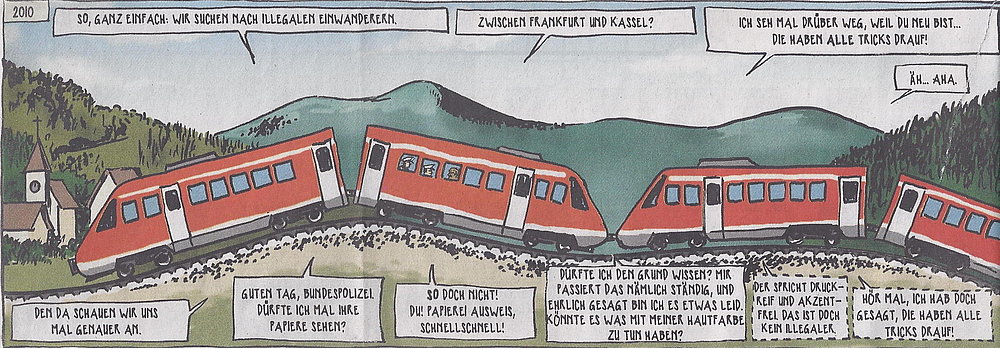The case
Since spring 2012 BUG has been supporting, through public relations work and networking, the lawsuit of a young black German man who underwent a stop-and-search police check.
The young man was subject to a check by the Federal Police in a regional train between Kassel and Frankfurt. The plaintiff was the only person that was asked to present his papers. This was not the first time that he had been the sole person in a train carriage chosen for such a check. Because of this, he refused to show his identification card. The police officers did not give a reason for the inspection, and repeatedly asked the young man to present his identification. At this point the plaintiff mentioned that this kind of demeanour reminded him of the methods of the SS. The young man was subsequently removed from the train and taken to the nearest police station. There, his backpack was searched and an identification document was found. One of the police men felt insulted by the young man’s comment and filed a lawsuit against him. In the first instance he was found guilty of defamation of a civil servant on duty, but acquitted in the second instance of the court case. During the court hearings it became obvious that the federal police had chosen to inspect the young man solely on the basis of his skin colour. This caused the man, in turn, to press charges against the Federal Police and their stop-and-search tactics based on ethnic profiling. The verdict (5 K 1026/11.KO) rejected the lawsuit against the Federal Police, because the judges felt the stop-and-search procedure was warranted. They noted that the police have the right to conduct these checks without grounds for suspicion. Therefore, according to the judgment, they are allowed to choose people based on appearances.
The verdict has received attention throughout Germany, since this was the first court case regarding this practice.
For further information about the legal details of the case, visit the website of the plaintiff’s attorney.
Amicus curiae brief
The BUG has filed an amicus curiae brief (legal opinion of a third party) to the second-instance court in order to verify the constitutionality of the first instance verdict.
The German Institute for Human Rights has also filed an amicus curiae brief with the court. You can view this document here.
The court hearing
On 29 October 2012, a five-hour court hearing at the Higher Administrative Court of Koblenz led to the police acknowledging the illegitimate stop-and-search procedure. The Federal Police formally apologised to the plaintiff. Moreover the judges made it clear that stop and search based exclusively on ‘skin colour’ violates the principal of equal treatment (article 3, paragraph 3) of the German Basic Law. The minutes of the court hearing can be viewed here.
Media coverage
Click here for our press statement published in co-operation with ISD.
Here you can also find the press statement of the Higher Administrative Court of Koblenz.
BUG has produced an extensive press review.
Interview on the case aired by WDR.
Interview on the case aired by SWR.
ARD report on the case.
Networking
BUG supports the networking of organisations who work on racial/ethnic profiling.
You can find more information about racial/ethnic profiling in a thematic dossier.
Petition
BUG, together with the Initiative of Black People in Germany (ISD), led a petition, that aims to repeal the legal basis for identity checks without concrete suspicion, amend the General Equal Treatment Act (AGG) so that discrimination carried out by state actors can likewise be litigated, run specialised training for police forces, collect data on ‘stop and search’ and establish an independent monitoring structure that handles complaints against the police.
On 20 November 2012 signatures collected up till that point were handed over to members of the parliamentary petitions committee Memet Kilic (Green Party) and Kersten Steinke (Left Party).
The online petition was closed on 18 December. Please click here to go to the website of the petitions committee.
Press review on the opening of the petition.



